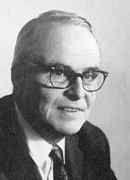Person: Tucker (2), Albert

Albert Tucker was a Canadian mathematician who worked in topology, game theory and non-linear programming.
Mathematical Profile (Excerpt):
- Although the Principal of his High School had suggested that he aim at becoming an actuary, in fact Tucker thought at this stage that he would become a schoolteacher of mathematics.
- The chairman of physics was very impressed with Tucker's report and asked him to change from a joint mathematics-physics degree to a single subject physics degree.
- The chairman of mathematics, Alfred Tennyson DeLury, agreed that he should change to a single subject degree but, of course, thought Tucker should choose mathematics.
- It was a difficult decision for Tucker who really enjoyed physics but felt that he had a deeper understanding of mathematics.
- In his final year of undergraduate study Tucker was advised by DeLury to go abroad for graduate study.
- Tucker immediately rejected the non-English speaking universities, and wrote to the University of Cambridge enquiring about their graduate programme.
- The courses did not look too attractive to Tucker so, after the award of his B.A. in 1928, he remained at Toronto for a fifth year.
- Tucker, however, wanted to go to Princeton and eventually DeLury agreed.
- However there was a part-time Instructorship which Princeton was about to fill so, with Alfred DeLury's support, Tucker was appointed to this position for 1929-30.
- Tucker received his doctorate in 1932 for his thesis An Abstract Approach to Manifolds.
- Tucker was a National Research Fellow during 1932-33, spending the autumn term at the University of Cambridge working with Max Newman.
- In 1954 he succeeded Emil Artin (who became Fine Professor at this time) as Albert Baldwin Dod Professor of Mathematics at Princeton, having become chairmen of the mathematics department at Princeton in the previous year.
- By chance, on this visit he met Tucker who asked him to explain what linear programming was.
- Tucker immediately saw it as a topic which would interest him particularly since he saw connections to ideas from his topological research.
- By the summer of 1948 the project had been set up at Princeton under the Office of Naval Research (there was no Office of Air Force Research) with Tucker as its director.
- Tucker began work with two graduate students, David Gale and Harold Kuhn, on the connections between linear programming and matrix games.
- From this time on Tucker published papers in conference proceedings, choosing to leave the regular journals for younger mathematicians.
- The rest of Tucker's research career was involved in aspects of game theory and linear programming.
- In 1949-50 Tucker took sabbatical leave which he spent at Stanford University.
- Tucker made up a setting for the Dresher-Flood game which he called the "Prisoner's dilemma".
- J J Kohn became a graduate student at Princeton in 1953 at the time Tucker became departmental chairman.
- In June 1961 Tucker was awarded an honorary D.Sc. from Dartmouth College.
- In 1967 the Mathematical Association of America presented their Award for Distinguished Service to Tucker.
- By his willing service to those ho would learn, teach, advance, or use mathematics, Albert William Tucker has added measurably to the vigour and quality of mathematics today.
- Tucker died of pneumonia at the Presbyterian Home of Meadow Lakes, a nursing home in Hightstown, New Jersey, after a long illness.
Born 28 November 1905, Oshawa, Ontario, Canada. Died 25 January 1995, Hightstown, New Jersey, USA.
View full biography at MacTutor
Tags relevant for this person:
Origin Canada
Thank you to the contributors under CC BY-SA 4.0! 

- Github:
-

- non-Github:
- @J-J-O'Connor
- @E-F-Robertson
References
Adapted from other CC BY-SA 4.0 Sources:
- O’Connor, John J; Robertson, Edmund F: MacTutor History of Mathematics Archive
